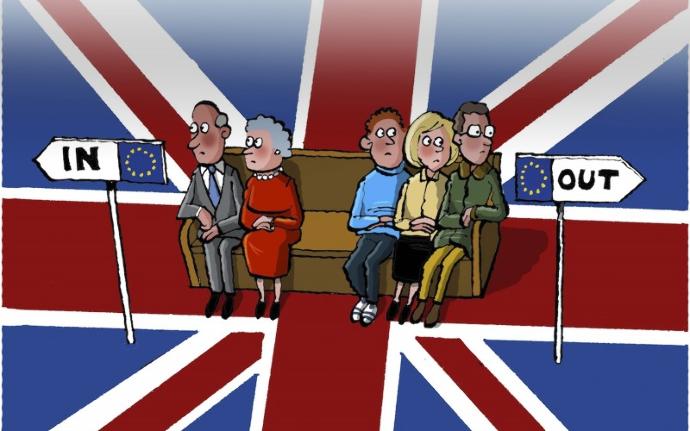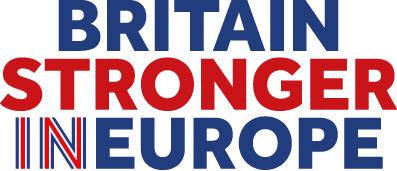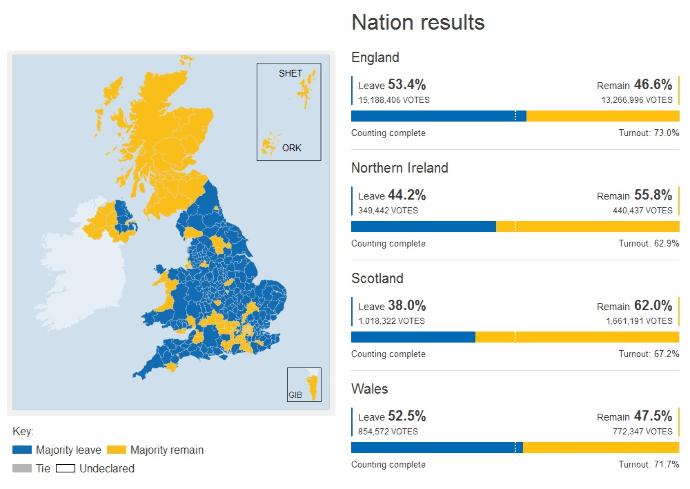
On June 23rd the United Kingdom held a referendum on whether to Remain or Leave the EU.
The result of the referendum was 51.9% voting to Leave and 48.1% voting to Remain. #Brexit
Personally I think a vote of 60% should have been required to leave since this is too big of a decision to be decided by 3.8% of the population.
Before I go into the result, I'd like to go over the arguments for each side. I will try my best to remain impartial.
Remain

The Remain campaign is the one I personally supported.
Here are their arguments.
Trade and Economy
-44% of Britain’s exports go to other EU countries. Breaking out of the European single market and putting tariffs would only hurt the British economy.
-Having the same standards allows for easier trade between European countries.
-It is much easier for other countries like the US, China or Japan to make trade deals with all of Europe at once instead of tweaking a separate deal for the UK.
-Leaving would mean the UK would need to strike fresh terms with 53 states covered by EU deals
-A lot of companies are dependent on trade with the EU that are based in the UK could leave
-The Bank of England, The UK Treasury and most economists support remaining in the EU
-The cost of membership is only about 1% of the UK's GDP which is £8.5 billion a year and not the ridiculous figure of £18 billion a year (£350 million a week on the Leave campaign buses) falsely claimed by the Leave campaign. This ridiculous amount of money was promised to be given to the NHS but has after the referendum been disowned by Nigel Farage.
Sovereignty
-Leaving the EU would mean that the UK would still have to meet the standards of trade imposed on EU nations except this time the UK wouldn't have a say on the regulations being imposed
-Britain retains a veto in many important areas
Security
-The UK is NOT a part of the Schengen area so everyone regardless of their point of origin must go through customs
-Europol membership allows the UK to share intelligence and fight cross-border crime
-The European Arrest Warrant has returned over 1,000 criminals to face justice in the UK
Farming and Fishing
-UK food and farming exports to the EU are worth £11.4 billion a year, with 76,000 agriculture jobs linked to EU trade
-The EU gives £3 billion a year in subsidies and protects 64 UK goods – cheese and pork pies included
Immigration
-Free movement of labour may not end since Norway and Switzerland still must allow it to reap the benefits of the EU without being member states.
-Immigrants, especially those from the EU, pay more in taxes than they take out
Leave

Here are the major points brought forward by the Leave campaign.
Trade and Economy
-The UK is the world's 5th largest economy so there's no doubt that countries will want to trade with them.
-Less regulation in the workplace would create more jobs
-The UK could get more investment from countries outside the EU
-Trade with the EU would continue since the UK currently has a trade deficit
-The money spent on EU membership would have greater benefit if spent domestically specifically on the National Health Service (NHS).
-EU citizens that claim welfare benefits in the UK are a drain on the economy
-Experts like the Bank of England and the UK Treasury have been wrong before most notably in the 2008 recession
-Only the EU can raise tariffs on non-EU states which means the UK can't protect its business interests
Sovereignty
-Unelected bureaucrats in Europe impose laws on the UK
-The British government has repeatedly been defeated in cases brought to the European Court of Justice
Security
-The UK will continue to cooperate with Europe in terms of security
-Being in the EU makes it easier for terrorists to sneak into the UK
Farming and Fishing
-Britain pays more for the Common Agricultural Policy (CAP) than it gets back so leaving the EU would make more money available for UK farmers
-The CAP also wastes lots of money on bureaucracy
Immigration
-The UK although not a member of Schengen must allow for EU citizens to work in the UK without a work permit which decreases the amount of jobs available for UK citizens
-An Australian style points based system should be used
More detailed responses
In the 50 minute video below, the audience asks more detailed questions which I didn't cover above.
Two representatives, one from each side answers the questions posed by the audience.
After the vote, what happens next
With Brexit winning in the UK, Article 50 of the Lisbon Treaty can be triggered after a series of law changes in the UK, such as the repealing of the 1972 European Communities Act.
Alternatively, the UK can negotiate with each member state separately.
David Cameron the current Prime Minister will step down in October.
The UK will have 2 years to negotiate their divorce with the EU after triggering Article 50 and come to a trade agreement. If it doesn't manage in that time then unless all EU members agree, Britain will be kicked out of the EU but that is highly unlikely.
In the meantime, the UK remains a part of the EU until all the details of the exit have been sorted out. So all EU laws and regulations still apply.

GIB -Gibraltar ORK - Orkney Islands SHET- Shetland Islands
As you can see above, Scotland and Northern Ireland overwhelmingly voted to stay in the EU. With Scotland voting 62% to remain and Northern Ireland voting 55.8% to remain. This goes to show that in a democracy, majority rules and everyone else must accept it.
Scotland has once again called for a referendum for their independence so that they can join the EU. Is this surprising? No. The Scottish National Party looks for any excuse it can find to try and achieve Scottish independence.
It is possible that another referendum may occur but it is not in Scotland's best interests to separate now when the market is already unstable.
Another interesting point about the results is that the majority of Leave voters were pensioners, while the majority of Remain voters are young adults.

The UK economy has currently taken a hit with the pound sterling at its lowest in 30 years.
This could actually be good for the UK since the exchange rate allows for more foreign investment.
I have no doubt that the UK will recover since it will be able to pursue more favourable trade deals across the world it will just take some time for the economy to recover.
How long it will take to recover is still unknown since the UK hasn't even left the EU yet and is already feeling the impact, it is still to be seen what will happen after the UK officially leaves the EU.
A lot of people are dissatisfied with the result of the EU referendum. On the one hand you have Remain voters who are sad that they've lost and are calling for another referendum with 2 million people already signing a petition. On the other hand there are some Leave voters that would've voted Remain had they known that the market would've reacted this way.
If the UK goes through with the Brexit this will encourage other countries to leave the EU as well, with people in Denmark, Netherlands and Italy calling for their own referendums.
To my fellow Gagers in the UK I wish your country the best. You made your voices heard and now things will begin to change.
Thanks for reading and I hope you enjoyed this myTake :)
 Holidays
Holidays  Girl's Behavior
Girl's Behavior  Guy's Behavior
Guy's Behavior  Flirting
Flirting  Dating
Dating  Relationships
Relationships  Fashion & Beauty
Fashion & Beauty  Health & Fitness
Health & Fitness  Marriage & Weddings
Marriage & Weddings  Shopping & Gifts
Shopping & Gifts  Technology & Internet
Technology & Internet  Break Up & Divorce
Break Up & Divorce  Education & Career
Education & Career  Entertainment & Arts
Entertainment & Arts  Family & Friends
Family & Friends  Food & Beverage
Food & Beverage  Hobbies & Leisure
Hobbies & Leisure  Other
Other  Religion & Spirituality
Religion & Spirituality  Society & Politics
Society & Politics  Sports
Sports  Travel
Travel  Trending & News
Trending & News
Most Helpful Opinions